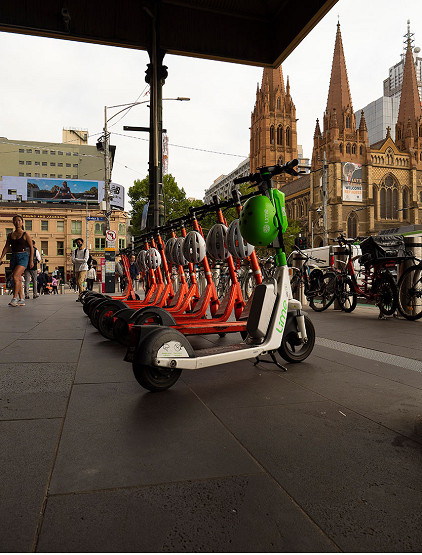Calls to enforce e-scooter safety in the CBD and surrounds reiterated after trial extended
CBD residents and pedestrian safety advocates are hoping that the state government’s extension of the electric scooter hire scheme will see safety issues such as illegal footpath riding addressed.
Minister for Roads Melissa Horne announced in March a six-month extension to the trial, which was launched in January last year and has seen 3.7 million short trips in Melbourne through scooter hire companies Lime and Neuron.
Private scooters were previously classified as unregistered vehicles, with their use in public spaces attracting a $925 fine, but this ban was lifted when the changes came into effect from April 5.
Under the trial’s extension, e-scooters will be permitted on roads with a speed limit of 60km/h or less, up from the 50km/h limit that was in place. They can be ridden on roads, in bicycle lanes, on bicycle paths or separated and shared paths, but will remain illegal on footpaths.
The minimum age of riders will also be lowered from 18 to 16 but all riders must still wear a helmet and adhere to the same blood alcohol content and drug use restrictions as motorists.
Riders cannot consume alcohol while travelling on an e-scooter. E-scooters cannot travel above 20km/h, while devices capable of travelling faster than 25km/h are not classified as e-scooters and are still illegal.
East Enders residents’ group president Dr Stan Capp said while he supported a more sustainable mode of transport that reduced carbon emissions and provided an alternative to cars and motorbikes, the enforcement of e-scooter rules needed to be made a priority or the trial “would be a waste of time”.
“I think there are legitimate reasons why residents are concerned about e-scooters that don’t obey the law,” he said.
This included policing illegal footpath riding and ensuring insurance policies were in place so that third parties, such as pedestrians, were covered if they were struck by a rider using a footpath or not wearing a helmet.
Dr Capp said he also hoped the laws around e-scooters “would be widely publicised in an intensive education program”.
“The caveat is: comply with the rules and then enforce the rules,” he said, adding if there was no means of enforcement “then it becomes a pointless trial because we know it won’t work”.
“I’m not sure why you need another six months to work that out.”
Dr Capp also said that after reporting illegal behaviour, “I was advised that there were no resources available to follow up and for me to complain to the City of Melbourne”.
Victoria Police Assistant Commissioner for Road Policing, Glenn Weir, said Victoria Police’s role in the e-scooter trial “has always been about enforcement, and this doesn’t change”.
“We will continue to enforce the e-scooter rules in line with the extended trial,” he said.
“The extended trial will help us to understand further how both hire and privately owned e-scooters can be used safely.”
Mr Weir added Victoria Police had advocated its position regarding e-scooters in conjunction with other road safety partners, “however, we respect the decision of government”.
Victoria Walks executive officer Ben Rossiter said while their organisation supported different modes of transport to move around the city, it “has repeatedly called for measures including investment in more separated bike lanes that would reduce the rampant use of e-scooters on footpaths, as well as e-scooter rider insurance to cover walkers being hit on footpaths”.
The state government said further work would be carried out during the trial extension to understand product safety standards, rider education and if any changes to penalties were needed.
Government data from the trial showed about 400 tonnes of carbon had been saved through e-scooter use, with riders hiring e-scooters mainly for leisure, social events, commuting and visits to cafes. •

Council endorses office tower at Flinders Lane despite querying car park demolition



 Download the Latest Edition
Download the Latest Edition